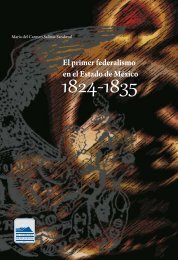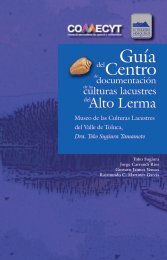Create successful ePaper yourself
Turn your PDF publications into a flip-book with our unique Google optimized e-Paper software.
KORPUS <strong>21</strong>, VOL. 4, NÚM. <strong>10</strong>, 2024, 113-126<br />
beliefs, and private disputes. In other words, the<br />
media created the substrate for nation and modern<br />
citizenship.<br />
Affective links forged by the media are often<br />
hard to find and harder to measure. Yet, they<br />
are elements of history, perceptible through intimate<br />
biography. Consider: In the early 1940s<br />
Pepe’s mother Lupe worked at a wartime mica<br />
factory in Oaxaca. Her husband had gone to<br />
Mexico leaving her with two young children:<br />
would he return, would he call for them to join<br />
him or would he abandon them? Lupe sang sacred<br />
music in church choirs, but she also listened<br />
to the tunes played over the radio in the tenement<br />
she and her boys occupied. She would<br />
sit at her sewing machine in the late afternoon<br />
singing the deeply impassioned songs of Maria<br />
Grever she had learned from the radio:<br />
Bésame, con un beso enamorado<br />
Como nadie me ha besado desde el día en que nací,<br />
Quiéreme, quiéreme hasta la locura<br />
Y así sabrás la amargura que estoy sufriendo<br />
por ti. 2<br />
“Why are you crying?” Pepe would ask his<br />
mother. “Because I want to talk to your father.<br />
I want to tell him how lonely I am. I miss him so<br />
much. I want all of us to be together” and she<br />
would embrace us and kiss us. She would stroke<br />
our hair and give us the love she felt for him”.<br />
José Zuñiga Sr., Pepe’s father, did call for<br />
them. They joined him in a cramped apartment<br />
in the Colonia Guerrero in 1943 when Pepe was<br />
six years old. The Philco radio played all day as<br />
the parents, tailor and seamstress, sewed. It<br />
played into the night. Theirs was not a happy<br />
marriage: Lupe was jealous, José stepped out a<br />
lot, his sisters and mother tortured her, and he<br />
did not defend his wife; he thought she favored<br />
her brother over him; he doubted their first born<br />
was his. This mistrust exacerbated the everyday<br />
struggle to put food on the table, to keep the<br />
children clothed, in shoes, and in health. The radio<br />
smoothed over grievances. It calmed tempers. It<br />
filled life with intimate feeling. It fomented communication.<br />
The entire family delighted in rendering<br />
verdicts in cases of marital discord brought<br />
2 “Kiss me, with a kiss of love/As no one has kissed me since<br />
the day I was born/ Love me, love me like crazy/ And you will<br />
know the bitterness I am suffering for you”, see: , November <strong>10</strong> th , 2023.<br />
to the air by La Doctora Corazón, “Queridos amigos,”<br />
she told her listeners, “Write to me, because<br />
remember, I make your problems my own”.<br />
The impassioned boleros they heard created<br />
sympathies shortening the affective distance<br />
between Lupe and José, even when their reverie<br />
drifted in different directions. When they<br />
listened to Maria Luisa Landin sing Amor perdido,<br />
maybe José, Pepe imagined, was thinking<br />
about the mysterious Lidia, about whom it was<br />
rumored he had had an affair, or perhaps Lupe<br />
felt a profound sadness believing that José did<br />
not return her love. Maria Luisa Landin’s tender<br />
lament touched Lupe in its excruciating selfdepreciation:<br />
“It’s sure you are happy without<br />
me… you were never mine… No, when you pass<br />
me on the street you needn’t say hello. I am<br />
not wounded”. Yet the song ends on a glorious<br />
note of applause: “Let us cheer for pleasure and<br />
love!”. José and Lupe, helped by a short rupture<br />
in which Lupe asserted her rights, stayed together<br />
till the end of their long lives. He came to<br />
see her, as he told Pepe, as O-Lan, the wife in the<br />
movie The Good Earth, long-suffering, abused,<br />
and yet responsible for the family´s survival and<br />
success.<br />
Music, which wafted from every jukebox or<br />
radio in every store, smoothed the sharp edges<br />
of scarcity, distrust, conflict, and loneliness that<br />
marked the neighborhood and its immigrant<br />
families fighting to make ends meet and to get<br />
ahead, to save themselves from alcoholism,<br />
crime, jail, sickness, defeat, all of which lingered<br />
around the corner and in their midst. As an institution<br />
of the state’s soft power and of market<br />
expansion (it advertised soaps, candies, toothpaste,<br />
shampoo, chocolate milk, aspirin), radio<br />
directly targeted children from an early age. The<br />
Zúñiga children listened to Nick Carter Detective<br />
and the mysteries of El Monje Loco, who<br />
immersed them in vicarious suspense and terror;<br />
Cuca la Telefonista, who made them giggled<br />
at her silly jokes; the history of Emperor Maximiliano<br />
y Empress Carlota they tried to follow.<br />
Above all, they listened to Cri-Cri, the singing<br />
cricket created by Gabilondo Soler who from<br />
1934 sang to millions of Mexican children each<br />
weekend over XEW, La Voz de Latinoamérica<br />
desde México.<br />
Cri-Cri sang about the same middle-class values<br />
promoted by Pepe´s public primary school:<br />
117



![bicentenario_1[V2]](https://img.yumpu.com/68677971/1/167x260/bicentenario-1v2.jpg?quality=85)
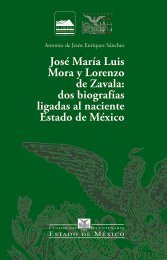
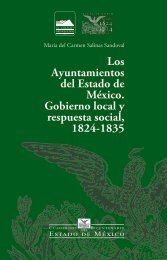

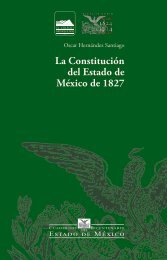
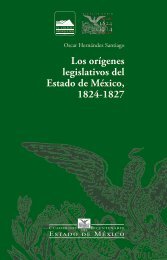
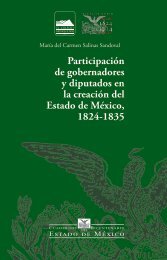
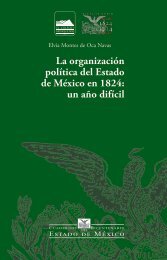
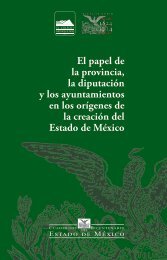
![El_primer_federalismoEM[final]_compressed (2)](https://img.yumpu.com/68483279/1/178x260/el-primer-federalismoemfinal-compressed-2.jpg?quality=85)
